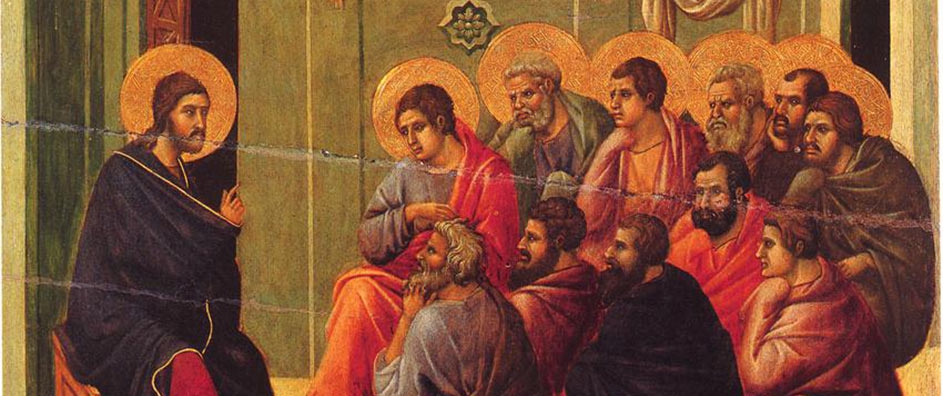The views expressed in our content reflect individual perspectives and do not represent the authoritative views of the Baha'i Faith.
The early Christians did not believe that Christ was God. It wasn’t until the end of the first century of Christianity, almost a hundred years after the crucifixion, when the Gospel of John was written, that the dogma of Logos theology blossomed into its full form. The gospel begins:
1. In the beginning was the Word, and the Word was with God, and the Word was God.
2. The same was in the beginning with God.
3. All things were made by Him; and without Him was not any thing made that was made.
4. In Him was life; and the life was the light of men. – John 1.
Only John’s gospel, and his alone, has Jesus say: “Before Abraham was I am” and “I and my Father are One” (Jn 8:58 & Jn 10:30). Problematically, John’s gospel has always been understood as more of a theology than a history. It is John’s interpretation of Jesus’ mission and station expressed in John’s own words, i.e. in terms of the Logos (Word). Caution is advised in blindly accepting John’s interpretations as coming from Jesus.
What has become incarnate in Christian theology is the Logos, God’s Word — not God. Armed with this understanding, a Christian may be tempted to conclude that Jesus mind was God’s Word incarnate. Alas, this too is heretical — part of the Apollinarian heresy. For the brilliant mind of Jesus was not God or Logos incarnate.
All of this detail serves to underscore the doctrine of the incarnation as constructed and complicated. Shaping it was hard work, involving a cast of hundreds of players, some of whom hated each other, with intercity rivalries and vicious politics, excommunications and public denunciations. It cost some people their lives and many people their comfort. It required the use of dozens of specialized and technical words many of which must still be defined if we are to understand this battle. It ended, if it ended at all, with a doctrine – a piece of paper.
A committee hammered out the official position of the church on the nature of Christ at Chalcedon, across the Bosphorus from Constantinople, in October of 451. The doctrine is so technical that few understand and agree on its meaning. The doctrine reads:
Following the holy fathers we, with one voice, define that there is to be confessed one and the same Son, our Lord Jesus Christ, perfect in Godhead and perfect in manhood, truly God and truly man, or rational soul and body, of the same substance [homoousion] with the Father according to the Godhead, and of the same substance [homoousion] with us according to manhood, like to us in all respects, without sin, begotten of the Father before all time according to the Godhead, in these latter days, for us and for our salvation, born of the Virgin Mary, the Mother of God [Theotokos] according to the manhood, one and the same Christ, Son, Lord, Onlybegotten, in two natures, inconfusedly, immutably, indivisibly, inseparately, the distinction of natures being by no means taken away by the union, but rather the peculiarity of each nature being preserved and concurring in one person [prosopon] and one substance [hypostasis], not parted or separated into two persons, but one and the same Son and Onlybegotten, divine word [Theon Logon], the Lord, Jesus Christ; as from the beginning the prophets declared concerning him, and Lord Jesus Christ has taught us, and the creed of the holy fathers has transmitted to us. – Quoted in The Christologic Controversy p. 10.
A few terms beg clarification. Homoousia is usually translated as “same substance” or “same nature” but it has different philosophical meanings. There is, according to Aristotle, primary substance – an individual thing – and secondary substance – a shared property. Hypostasis also refers to substance, but the substance of experience – an object before us. Already we are in trouble. To simplify, the incarnation doctrine can perhaps be fairly stated as this: that Jesus was of two natures, one of the same substance with the Father and one of the same substance with man, but concurring in one person and having one substance. If that seems incomprehensible, you’re not alone. The Baha’i teachings have this to say about the dogma of Logos theology:
The Lord Christ said, ’He that hath seen Me hath seen the Father’ — God manifested in man. The sun does not leave his place in the heavens and descend into the mirror, for the actions of ascent and descent, coming and going, do not belong to the Infinite, they are the methods of finite beings. In the Manifestation of God, the perfectly polished mirror, appear the qualities of the Divine in a form that man is capable of comprehending. This is so simple that all can understand it, and that which we are able to understand we must perforce accept.
Our Father will not hold us responsible for the rejection of dogmas which we are unable either to believe or comprehend, for He is ever infinitely just to His children. – Abdu’l-Baha, Paris Talks, p. 25

















Comments
Sign in or create an account
Continue with Googleor